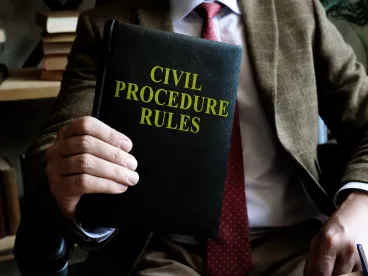A proposed amendment to Federal Rule of Civil Procedure 7.1, which had previously required information so judges could determine if they had a conflict of interest, would require a party in a diversity action to name and disclose the citizenship of every individual or entity whose citizenship is attributed to that party. Chief Justice Roberts submitted the proposed amendment on April 11, 2022. The amended Rule 7.1 takes effect December 1, 2022, unless Congress acts.
The relevant addition to Rule 7.1(a)(2), if amended, would read:
(2) Parties or Intervenors in a Diversity Case. In an action in which jurisdiction is based on diversity under 28 U.S.C. § 1332(a), a party or intervenor must, unless the court orders otherwise, file a disclosure statement. The statement must name—and identify the citizenship of—every individual or entity whose citizenship is attributed to that party or intervenor:
(A) when the action is filed in or removed to federal court, and
(B) when any later event occurs that could affect the court’s jurisdiction under § 1332(a).
The March 2021 Report of the Judicial Conference Committee on Rules of Practice and Procedure expressed that the aim of the new Rule 7.1(a)(2) disclosure requirement is to facilitate the early determination of diversity jurisdiction under 28 U.S.C. § 1332(a). The courts do not have diversity jurisdiction over a case if a nonparty individual or entity whose citizenship is attributed to a party is a citizen of the same state as an opposing party. The Committee suggested that the disclosure rule will protect against the belated discovery of a diversity-destroying citizenship, thus avoiding waste.
The Committee acknowledged that complexities may arise from the proposed amendment. Ascertaining the attributed citizenship of layers of noncorporate entities may be difficult. For instance, a limited liability company (LLC) is a citizen of every state in which its members reside. The same rule applies to partnerships. An LLC could have an extensive list of members, including natural persons, other LLCs, corporations, partnerships, or other noncorporate entities. However, an LLC might not have the complete citizenship information of every member, not to mention the members of its LLC members. Rule 7.1(a)(2) would require the LLC named in the federal action to inspect the names and citizenship information of every investor. If those members are other LLCs, partnerships, or noncorporate entities, the party would also have a duty at the outset of the case to investigate the names and citizenships of, e.g., each of its members’ members, which could continue for many layers.
Therefore, while intended to preserve resources, Rule 7.1(a)(2) may lead to litigants expending greater resources upfront on the jurisdictional inquiry. The Committee noted that the rule does not address what happens if the party or intervenor cannot ascertain every citizenship attributed to it. Thus, in the most complicated of noncorporate layers, the Committee contemplates that Rule 7.1(a)(2) may still fail to establish clarity of the jurisdictional facts. Thus, a court may need to order limited discovery to ascertain the completeness or accuracy of the disclosed names and citizenships.
Although the exercise described above often has to happen at some point in order to ensure that the federal courts actually have diversity jurisdiction over a case, there may be unintended consequences of requiring parties to make such disclosures at the outset of the case. For example, many investors in LLCs and limited partnerships expect their investments to remain confidential. Rule 7.1(a)(2) would disturb those private financial relationships and require a defendant LLC/LLP that has been sued on diversity grounds to reveal all of its members/partners. Rule 7.1(a)(2) could thus lead to the filing of federal litigation for the purpose of discovering a private entity’s investors (although a plaintiff and its counsel is still subject to the requirements of Rule 11).
The proposed amendment does allows the Court to limit the disclosures, which may, in some instances ameliorate the concerns with public disclosure of an entity’s members. For example, a party might promptly reveal a diversity-destroying citizenship to stop further disclosure. A party could also seek a court order requiring that names be protected against disclosure to other parties and the public, if the disclosing party proves a privacy interests exists and no apparent need for further discovery. Ultimately, complex noncorporate entities in federal court, should be prepared for greater expenses to defend their privacy interests and prove their attributed citizenships.
Rule 7.1(a)(2) likely goes into effect on December 1, 2022.


 />i
/>i

